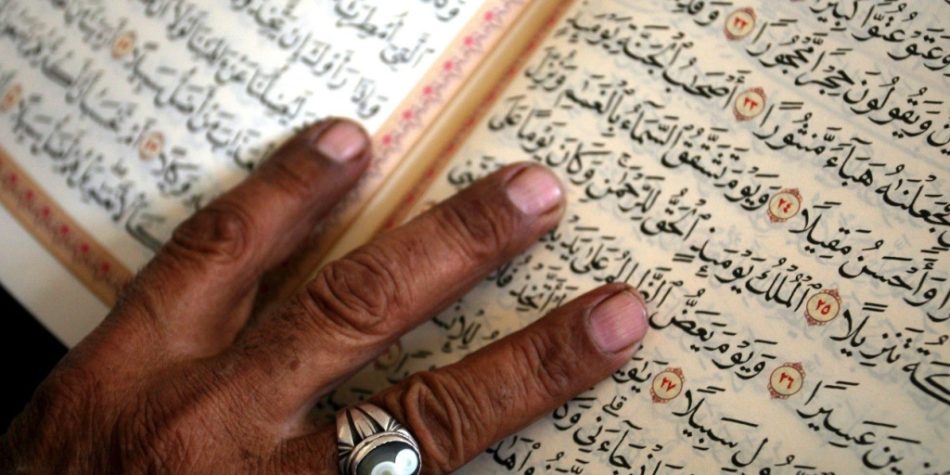Few things can sharpen understanding of your own faith like studying that of another.
I’m a follower of Jesus Christ, a Latter-day Saint in particular, and one incurably interested in faith generally. Joseph Smith encouraged us to “get all the good in the world” and to “receive truth, let it come from whence it may.” One of those sources for me in 2021 is Islam. I’ve had important interactions with this faith over the years, including attendance at a lecture in Salt Lake City from Imam Yasir Butt, hearing a speech from Imam Khalid Latif of New York University, and visiting Jerusalem where I frequently heard the muezzin’s enchanting calls to prayer.
Consistently, apostles in the Church of Jesus Christ have encouraged Latter-day Saints to better understand both similarities and differences between our faith and Islam. For instance, in October 2021 Elders David A. Bednar and Gerrit W. Gong introduced a forthcoming pamphlet designed to help Muslims and Latter-day Saints do just that. “The two faiths are different in many of our core doctrines, but many of our values and the ways in which we practice our respective faiths are similar and reflect our love of God and of our fellow man,” Elder Bednar said. Elder Gong added that learning about our Muslim friends “will help us be more kind and more accurate in what we say and feel about each other.”
Imam Butt of Utah’s Noor Masjid congregation told me and a small group of listeners that he could speak to us all day about the delights of strawberries. But without tasting one we would never know how delicious a strawberry is. That’s how it is with the Qur’an, he said. We must read the book to experience its goodness.
With that motivation, the Qur’an and a collection of hadith (sayings of the Prophet Muhammad) are part of my morning devotional readings. I recognize, as Rachel Pieh Jones has written, that “there is no single Islam, and Muslims across the globe are not a monolith.” What I’ve read and experienced tells me that Islam is beautiful. The Qur’an is a delight. The hadith can be illuminating. In the light of these readings, my soul expands. So many of these books’ sacred passages have enlightened my mind in unique ways, giving me more tools to live a better life.
Beauty comes not only from the texts’ obvious truths but also in moments of clarity revealed in doctrinal differences. For example, in my reading, the Qur’an corrects a perceived error of polytheism and returns people to a strict monotheism—the idea that there is one and only one God. Here’s a notable line from the Qur’an’s fourth sura, which also contravenes a core Christian conviction:
“People of the Book, do not go to excess in your religion, and do not say anything about God except the truth: the Messiah, Jesus, son of Mary, was nothing more than a messenger of God … So believe in God and His messengers and do not say ‘three’ … God is only one God, He is far above having a son, everything in the heavens and earth belongs to Him and He is the best one to trust.” The logic works. If God is all-powerful, why does He need a son to save people? Can’t He just save us by Himself?
The Father and the Son’s simple examples of sacrifice and submission can transform hearts and homes from here to eternity.
The Qur’an gives God many names. In fact, the text tells us, “the best names belong to Him.” These include the Lord of Mercy, the Giver of Mercy, the Ever Watchful, the Tremendous, the Source of Peace, and many more. But in my copy (a 2016 Oxford University Press translation from M.A.S. Abdel Haleem), not one of those names is “Father.”
The Qur’an’s great strength is its emphasis—and what a strong and admirable emphasis it is!—on living a life that gives its highest devotion, its ultimate loyalties, to God alone. “Praise belongs to God. … It is You we worship; it is You we ask for help. Guide us to the straight path: the path of those You have blessed” (emphasis mine). The book begins with those words, a key part of Islamic worship and an obligatory aspect of the prayers Muslims repeat several times daily. It’s a message most believers, myself included, wholeheartedly embrace. It is at the core of what Jesus tried to teach the Jews throughout His ministry.
But the heavy focus on monotheism throughout the text overcorrects and misses the beauty of a God who is a family man.
In the New Testament, Jesus speaks repeatedly of and to His Father in Heaven. “I must be about my Father’s business (Luke). “To see me is to see the Father” (John). “Father, forgive them; for they know not what they do” (Luke).
My mind stirs at the idea that the “Lord of every sunrise” (Qur’an 37:5) is my Heavenly Father. Jesus taught us to pray, “Our Father which art in heaven …” My heart melts to think that Jesus of Nazareth is not only a great teacher and prophet (as the Qur’an says) and the “King of kings” (as the New Testament tells us) but also my brother. “Who are my mother and brothers?” Jesus asked. “Whoever does God’s will is my brother and sister and mother.” I’m filled with awe at the bigness of a God who is “Lord of the East and West and everything between them” (Qur’an 26:28). And I’m touched to have a Father and a Savior brother who are not too grand or important to know me, cipher that I am. The Father calling the teenage Joseph Smith by name in the boy’s First Vision of Deity is, in the Latter-day Saint tradition, a parable of sorts for how the Father knows all our names as if He were a member of our immediate family.
None of us was begotten by the Father the way Jesus was. Yet we are His creation, brothers and sisters in His family. Our relationship with the Father is filial. Our connection to Jesus is familial. Their salvific solution is eternal.
At Christmas, we give and receive gifts. No gift is greater than the Father’s sacrifice of His Son—the Gift of Gifts that unlocked “everlasting life” for us. In his 2018 Christmas message, Russell M. Nelson, the president and prophet of The Church of Jesus Christ of Latter-day Saints, clarified that eternal life is much more than “simply living for a really, really, really long time.” It is, in fact, “the kind and quality of life that Heavenly Father and His Beloved Son live. When the Father offers us everlasting life, He is saying in essence, ‘If you chose to follow my Son—if your desire is really to become more like Him—then in time you may live as we live and preside over worlds and kingdoms as we do.’”
President Nelson is getting at the Latter-day Saint idea of eternal families that Joseph Smith taught. Joseph, channeling the Apostle Paul, described this idea as “a far more, and an exceeding, and an eternal weight of glory.” That’s because it’s heavy stuff, deep doctrine for sure. It’s also simple and lovely. Heaven, Joseph said, is much like earth. “That same sociality which exists among us here will exist among us there, only it will be coupled with eternal glory.” And the people there, the Father and the Son included, have bodies. They eat, they talk, they laugh, they love. And marriage and family relationships can if we want them to and if we obey the heavenly law that makes them so, cross the chasm of death and last forever.
As the happy husband of Melissa and the father of three little cherubs, the idea of eternal family life delights me. My parents and siblings first taught me the Christian virtues. And now I am both the teacher and the taught in my own home. I can’t imagine a better heaven than helping God’s children grow in love, worlds without end.
Of course, not everyone wants this. Many people carry the seemingly unforgivable wounds of abuse or neglect. Who would want to be coupled forever with the cruel and the crazy?
British actor Stephen Fry sums up this view nicely. He said a Latter-day Saint once told him that in the next life “all families will be reunited—you’ll be with your families forever.” Fry, understanding this as some kind of eternal prison sentence, asked her, “What happens if you’ve been good?” Reflecting on this experience years later, Fry described this (mistaken) view of eternal families as “a ridiculous idea.” He asked incredulously, “How is that supposed to be attractive, that you’re going to be stuck with every aunt and every cousin and every, well, good gracious, every alcoholic or slightly deviant uncle? It’s just the most awful destiny imaginable.”
We know little of what a family-centered heaven will look like. Latter-day Saint scriptures and prophets provide valuable details. But we know far less than we sometimes think we do. Even so, I’ll wager that our Father will not force us into an eternity with people who make us uncomfortable. He will give each of us exactly what we want. Our desires guide our actions, which in turn shape the beings we are becoming each day. As scholar James K.A. Smith wrote, “it is [our] desires that define [us]. In short, [we] are what [we] love.”
Jesus prayed to His Father:
The goal is for all of them to become one heart and mind—
Just as you, Father, are in me and I in you,
So they might be one heart and mind with us.
(John 17, MSG)
As we think of Jesus this Christmas, let us also think of His intimate relationship with the Father and what it means to be a family ruled by love and unity. The Father and the Son’s simple examples of sacrifice and submission can transform hearts and homes from here to eternity.















